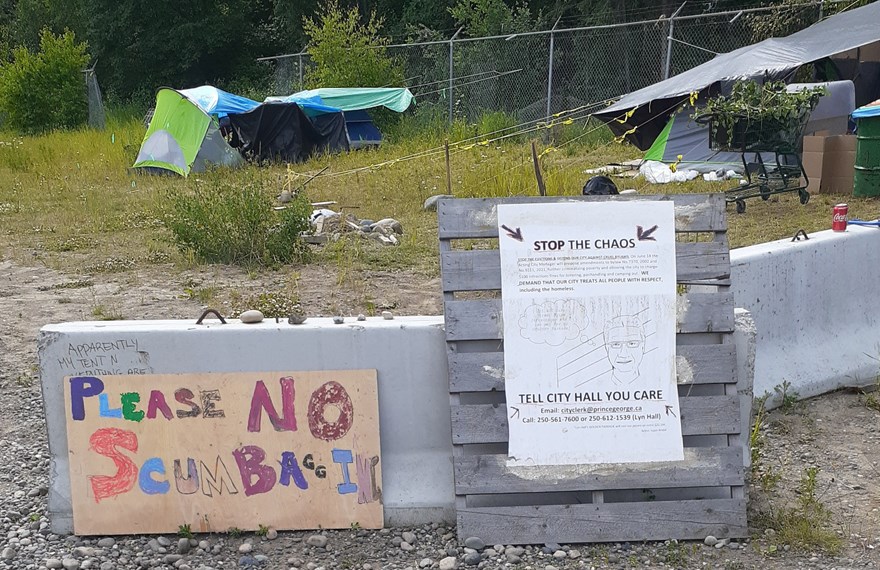The tent city at the end of
Right away, there’s a warning sign set up at the entrance.
PLEASE NO SCUMBAggING, it reads.
It’s a polite warning but it sends the message.
Those who steal from other homeless people are not welcome, one resident of the tent city explained on her way past the sign heading into the downtown core.
Almost everyone who is camping there are in clusters of two, three or even four tents, while others prefer to be close by but remain solitary.
Patronia, a First Nations woman who has been living on the streets for the last seven years, lives with her girlfriend and their friend‘s tent is about three feet away. The entrances face each other. Seems safer that way. There are barriers up like a grocery cart that acts as a bit of a buffer between their tents and the worn roadway through the area that gets plenty of traffic on it each day as police and bylaw officers drive through or stop and check on people. Several organizations have staff come by with supplies like water and sandwiches while other good Samaritans stop by with bags of burgers to offer to those who want some lunch.
It’s all very nice but it’s not really what they need.
“I want a home,” Patronia said, head down, shoulders hunched protectively, as she compulsively untied knots in a short length of white rope. “Just need a chance - a break - to get clean and to find a job. I had a good job once but my addiction took it all away.”
“We all need a break,” another anonymous homeless woman said.
She seemed a bit preoccupied as she had her sock on her hand like a mitten and with her lighter tried to melt the polyester together to mend it.
It didn’t seem to matter that she was burning her fingers. She wanted to fix that sock.
Dallas Calliou, 24, a man living on the streets of downtown Prince George for the last five years, used to live at the tent city on George Street across from the courthouse but he moved down to the Lower Patricia Boulevard location just a week or so ago.
“There’s more space here and that way we’re out of the public eye,” Calliou said. “And that’s what the mayor wants, right?”
Calliou built himself a teepee.
“I wanted it to be more traditional,” he explained about the 15-foot-high tarped teepee that is his new residence. “It’s something different from everyone else.”
There’s white hand prints all over one of the tarps.
“I think it looks cool.”
Calliou built the teepee right under one of the many street lights in the barbed-wire fenced in area.
“That light turns off and on every five minutes or so all night long,” he said, pointing to the one right overhead. “We’d like it if all these lights worked.”
There were claims that people living above the tent city were aggressive, using bear bangers and throwing lit firecrackers at the homeless who were camping in the area.
“That was when we were on the other side of the fence,” Calliou explained.
“We didn’t think we were allowed in this area so we were along the path in back. Once we moved into this area it’s been quiet.”
But that will soon change.
“What we’ve heard is there’s an eviction notice for here and
City council voted in favour of a controversial proposed bylaw that would impose fines for “nuisance” behaviour like panhandling, open drug use and camping in public areas.
While protesters advocating for the rights of the homeless camped on the lawn of city hall, a sometimes emotional debate about the Safe Streets Bylaw was going on inside city council chambers last Monday night.
In a 5-3 vote, city council approved the first three readings of the Safe Streets Bylaw. Councillors Murry Krause, Cori Ramsay and Frank Everitt voted against the adoption of the bylaw.
Coun. Susan Scott was not at the meeting.
Final reading of the bylaw is expected to come before city council on Monday.
On May 20, The Citizen checked in with the homeless who were settled at the
“What happens when I finally get my stuff together and finally get a home, a driver’s licence - am I going to be so far in debt I won’t be able to do anything else but pay these things off? So why bother trying to get a job if I have to start out with pile of debt?” he said.
For others it’s something else that keeps them from finding a permanent residence.
“I want a home,” Calliou explained. “It would take some motivation but I guess when it comes down to it I just want everyone else that’s here to follow me but that will take time. So I stay here.”
- with files from


